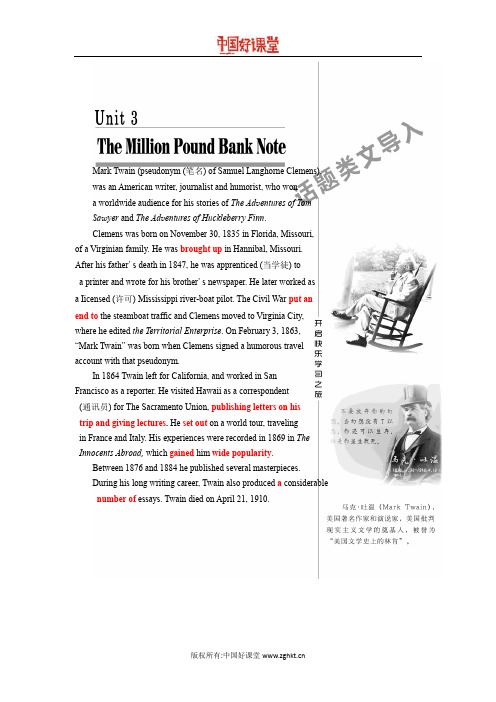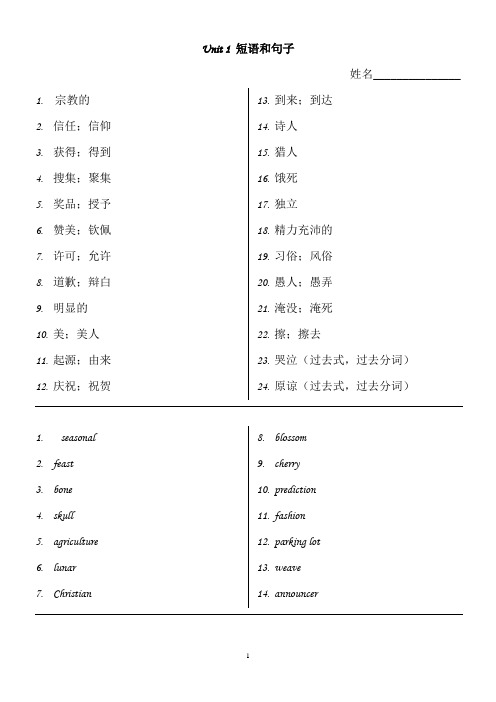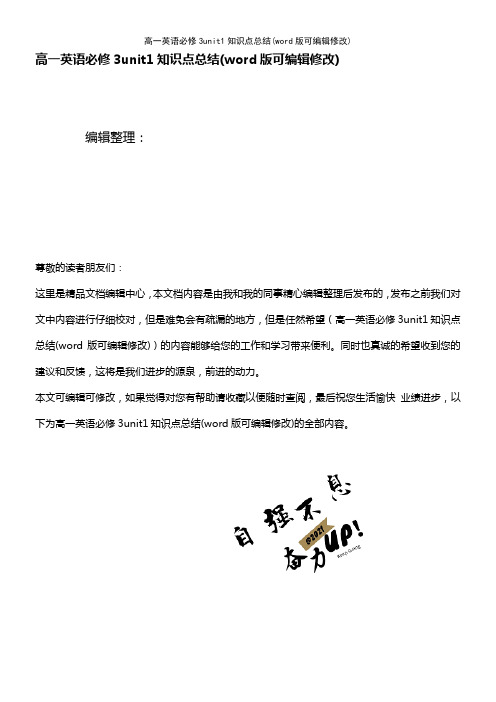2016新课标三维英语 必修3 unit 1 单元小结
高中英语必修第三册第一单元课文读后感

高中英语必修第三册第一单元课文读后感After reading the first unit text of the third volume of high school English compulsory course, I was deeply touched by the story of Kisa Gotami in the Buddhist tradition. The story centers around the theme of impermanence and the inevitability of death, as well as the transformative power of compassion and understanding.The story begins with Kisa Gotami, a young mother who loses her only child. Overcome with grief and unable to accept her child's death, she goes from house to house seeking a cure. Finally, a kind old man advises her to bring a mustard seed from a household that has not known death. As Kisa Gotami goes from door to door, she realizes that death is a universal experience and that her own suffering is not unique. Through this realization, she finds acceptance and peace.This story resonates with me on a personal level as it reminds me of the transient nature of life and the importance of accepting change and loss. It also highlights the power of empathy and understanding in overcoming grief and finding solace in difficult times.Moreover, the story teaches valuable lessons about the nature of suffering and the universal experience of death. It reminds us that death is a natural part of life and that we must learn to accept it with grace and dignity.Overall, the first unit text of the third volume of high school English compulsory course is a powerful and poignant story that teaches us important lessons about life, death, and the power of compassion. It serves as a reminder to cherish the present moment and to find solace in the face of adversity.。
高中英语必修三第一单元知识点总结教学提纲

高中英语必修三第一单元知识点总结高中英语必修三第一单元知识点总结高中英语必修三第一单元知识点总结第一单元1)starve作不及物动词,表示“饿死,挨饿”。
starve for=be starve of/for,表示“渴望获得,迫切得到”。
2)pl作不可数名词,只用于肯定句中,表示“充足,大量,富裕”,可做主语,宾语或表语。
做主语时,谓语动词随着plenty所指的单复数形式作相应的变化。
plenty也可作副词,表示“充分地,十足地,好多”。
lenty表示“大量的,丰富,充裕”可作表语,定语,状语。
3)sa作及物动词,表示“满意,使满足”,直接跟宾语,若接that从句时,意思是“使相信”,从句前有间接宾语。
satisfy…with以……满足be satisfied with对……满足satisfy…for向……偿还be satisfied to do sth满足于做某事4)harm作名词,意为“损害”,不与不定冠词连用,常与do,come,mean等动词搭配。
darm than good弊大于利There’s no harm in(sb’s)doing sth=It dab to do sth做某事无害处作及物动词,表示“损害,伤害”。
5)lead作及物动词,表示“领导,引导”其宾语常接介词短语或者副词作宾补。
表示“影响,致使”时,后接介词to,也可以接不定式。
lead sb into使某人陷入某种不良的状态。
lead sb away使盲从,常用于被动语态。
lead nowhere毫无结果,,对……不起作用。
lead u作为……准备,导致。
lead sb b牵着某人的鼻子,完全操纵某人lead a dog’s life过困难的生活lead sb believe that使某人相信(假的事情或不确切的事情)lead the way带路,带头lead作为名词,give sb a lead给某人做出榜样,提示某人6)origin是名词,表示“起源,起因,出身”。
2016新课标三维英语 必修3 unit 1-S2

Section_ⅡWarming__Up_&_Reading_—_Language_Points对应学生用书P6 一、这样记单词三、这样记句式1.(教材P1)Discuss when they take place, what they celebrate and what people do at that time.讨论它们(中国节日)是什么时间举行,庆祝的是什么事件,人们在那天做什么事。
take place发生;举行2016.2016年夏季奥运会第一次在南美洲的里约热内卢举行。
②Great changes have_taken_place in China in the last few years.过去的几年里,中国发生了巨大的变化。
③It would be difficult to find a man to take_the_place_of him.找一个代替他的人会很难。
[名师点津]take place是不及物动词短语,其后不能接宾语,也不能用于被动语态。
2.(教材P1)At that time people would starve if food was difficult to find, especially during the cold winter months.在那个时代,特别是在寒冷的冬月,如果食物难以找到,人们就会挨饿。
starve vi.饿死;挨饿;饿得要死;渴望;极需要vt. 使饿死;使挨饿贫困地区的数以百万计的人们正在挨饿。
②They got lost in the desert and starved to death (die).他们因在沙漠中迷路而饿死了。
③There is no doubt that the homeless children starve for love.毫无疑问,这些无家可归的孩子渴望得到爱。
④They starved the enemy into giving in to them.他们断绝敌人的食物来源以迫使敌人向他们投降。
2016新课标三维英语 必修3 unit 3-S1

版权所有:中国好课堂
RODERICK:How well do you know London? HENRY:Not at all. It's my first trip here. RODERICK : I wonder, Mr Adams, if you'd mind us asking ⑱ a few questions. HENRY : Not at all ⑲ . Go right ahead⑳.
22 by accident(=by chance)偶然;无意中;不小心 ○
其反义词组是:on purpose“故意地;有意地”。
23 sail out of 驶出 ○ 24 bay/beI/n.海湾 ○ 25 stare at 盯着看;凝视 ○ stare/steə/vi.凝视;盯着看 26 what is left ...作介词 at 的宾语。此处 left 为形容词, ○
⑦
it. At this moment, they see a penniless young pavement Henry man
⑨
⑤doubt+n./pron./whether/if 怀疑„„ ⑥see a penniless young man wandering 为 see sb. doing sth.结构, 表示“看到某人 正在做某事”。 ⑦penniless/'penIlIs/adj.贫困的; 身无分文 的 ⑧wander/'wɒndə/vi.漫游;漫步;漂泊 ⑨pavement/'peIvmənt/n.人行道(=〈美〉 sidewalk) ⑩businessman/'bIznIsmæn/n.商人 ⑪be lost in 在某地方迷路;沉浸于 ⑫who 引导非限制性定语从句,修饰 an American businessman。 ⑬step inside 走进(=walk in) ⑭through the front door 通过前门。 门属于 立体空间,不是平面,穿过它须用介词 through。 ⑮on one's/the left 在左边;on one's/the right 在右边 ⑯permit/pə'mIt/vt.&vi.许可;允许;准许
必修三 Unit 1 总结

Unit 1 短语和句子姓名_______________1. 宗教的2. 信任;信仰3. 获得;得到4. 搜集;聚集5. 奖品;授予6. 赞美;钦佩7. 许可;允许8. 道歉;辩白9. 明显的10. 美;美人11. 起源;由来12. 庆祝;祝贺13. 到来;到达14. 诗人15. 猎人16. 饿死17. 独立18. 精力充沛的19. 习俗;风俗20. 愚人;愚弄21. 淹没;淹死22. 擦;擦去23. 哭泣(过去式,过去分词)24. 原谅(过去式,过去分词)1. seasonal2. feast3. bone4. skull5. agriculture6. lunar7. Christian 8. blossom9. cherry10. prediction11. fashion12. parking lot13. weave14. announcer1.发生2.纪念;追念3.盛装打扮4.搞恶作剧;诈骗5.期望;盼望6.日夜;昼夜7.好像8.玩的开心9.出现;到场10.守信用,履行诺言11.屏息12.出发;动身13.使……想起。
14.原谅某人做过某事15.未经允许16.获得独立17.因为。
而羡慕某人18.某人一到达19.旨在/ 理应做20.食物很难找到21.对。
造成破坏22.呈…的形状;以…的形式23.用。
装饰。
24.赏月25.聚会26.为。
而感到骄傲27.嘲笑28.打开(电视)29.对。
满意30.向。
挥手1.自古以来,世界各地就有各种各样的节日和庆典。
2.在那个时代,如果食物难以找到,特别是在寒冷的冬月,人们就会挨饿。
3.有些节日,是为了纪念死者,或者使祖先得到满足,因为祖先们有可能回到世上(给人们)提供帮助,也有可能带来危害。
4.万圣节如今是孩子们的节日,这天他们可以乔装打扮去邻居家要糖吃。
5.印度在10月2日有个全国性的节日,纪念甘地,他是帮助印度脱离英国而独立的领袖。
6.人们心怀感激因为过冬的粮食收集起来了,农活也结束了。
高一英语必修3unit1知识点总结(K12教育文档)

高一英语必修3unit1知识点总结(word版可编辑修改)编辑整理:尊敬的读者朋友们:这里是精品文档编辑中心,本文档内容是由我和我的同事精心编辑整理后发布的,发布之前我们对文中内容进行仔细校对,但是难免会有疏漏的地方,但是任然希望(高一英语必修3unit1知识点总结(word版可编辑修改))的内容能够给您的工作和学习带来便利。
同时也真诚的希望收到您的建议和反馈,这将是我们进步的源泉,前进的动力。
本文可编辑可修改,如果觉得对您有帮助请收藏以便随时查阅,最后祝您生活愉快业绩进步,以下为高一英语必修3unit1知识点总结(word版可编辑修改)的全部内容。
高一英语必修3Unit 1 Festivals around the world1。
mean doing sth。
意味着 mean to do sth. 打算或企图做某事 mean sb. to do sth。
打算让某人做某事 be meant for 打算作…用2. take place 发生;举行 take the place of sb= be in place of sb 替代某人3.of all kinds 各种各样的4..starve to death饿死 be starved of sth。
缺乏 starve for sth / starve to do 渴望5.be satisfied with感到满意 t o one’s satisfaction感到满意是.。
6. in memory of / in honor of 。
纪念某人7.do harm to sb。
=do sb. harm =be harmful to sb. 伤害某人8。
in the shape of呈…的形状9.award sth。
(to sb。
) =award sb。
sth.(for sth。
) 给予,颁奖 reward sb。
for sth. 因。
..奖赏某人10.reward sb。
高一必修三英语unit1课文知识点
高一必修三英语unit1课文知识点《高一必修三英语unit1课文知识点》本文为高一必修三英语unit1课文的知识点总结。
下面将根据课文内容,按照主题分类,以简洁明了的语言为您介绍课文中的重点知识点。
一、课文概述本单元的课文主题为“Teenage Life”,讲述了青少年的生活状态和他们所面对的种种挑战。
通过描述主人公Ruth、Simon和Tony的故事,课文涵盖了青少年问题、友谊、学业压力和梦想等方面的内容。
二、词汇与短语1. teenager:青少年2. challenge:挑战3. identity:身份4. overcome:克服5. support:支持6. pressure:压力7. communication:交流8. desire:渴望9. ambition:雄心;抱负10. future prospects:未来前景11. put effort into:努力去做某事12. dream of:梦想13. have confidence in:对...有信心14. face difficulties:面对困难15. be under pressure:承受压力16. build up relationships:建立关系17. achieve success:取得成功三、语法要点1. 一般现在时:用于描述事实、经常性行为或客观真理。
例如:Teenagers face many challenges in their lives.2. 一般过去时:用于描述完成的动作或过去发生的事情。
例如:Ruth wanted to be a doctor when she was young.3. 情态动词can:表达能力或可能性。
例如:Simon can speak three languages fluently.4. 情态动词should:表示应该或建议。
例如:You should have confidence in yourself.5. not...until...:表示直到某个时间或情况才发生或完成。
高中英语必修三第一单元知识点总结
高中英语必修三第一单元知识点总结1. 阅读理解1.1 主旨大意阅读理解是英语考试中的一项重要题型,其中涉及到的知识点主要包括文章主旨、文章结构、段落大意等。
在阅读理解题型中,通常会给出一篇短文或文章,要求学生通过阅读短文并回答相关问题。
解题思路上可以从以下几个方面入手:•首先,要迅速浏览全文,了解文章的主题和整体结构,有助于理解文章的意图和要点。
•其次,要仔细阅读题目,将题目和文章进行对应,并找出与题目相关的关键信息。
•最后,根据文章内容和所给选项进行推理和判断,选择正确答案。
1.2 词义猜测在阅读理解中,文章中经常会出现一些生词或不常见的词汇。
此时,学生需要通过上下文的暗示来推断出词义。
一些常见的词义猜测技巧包括:•上下文暗示法:通过查找上下文中给出的其他词或句子,来推断出生词的意思。
•词根词缀法:通过词根和词缀的意义来猜测生词的含义。
•关联词法:通过猜测与生词相关的其他词汇的意义,来推导出生词的意思。
在解题过程中,要综合运用以上猜测技巧,提高词义猜测的准确性。
2. 写作技巧2.1 写作主题在写作中,确定一个恰当的主题是非常重要的。
写作的主题应该贴切、明确,并且能够引起读者的兴趣。
同时,在写作过程中要注意围绕主题进行逻辑的组织,避免偏题。
2.2 表达观点和看法在写作中,要能够清晰地表达自己的观点和看法。
可以运用以下几种写作技巧来达到这一目的:•使用适当的句型和词汇表达自己的观点。
•运用举例和论证来支持自己的观点。
•注意语法和逻辑的正确性,避免写作中的错误和不连贯之处。
2.3 文章结构写作时要注意合理的文章结构。
通常情况下,一篇文章应该包括引言、正文和结尾。
其中,引言部分用于引入主题,正文部分用来展开论述和分析,结尾部分用来总结观点或给出建议。
3. 语法知识3.1 时态与语态在高中英语中,时态与语态是两个重要的语法知识点。
时态表示动词的时间,包括一般现在时、过去时、将来时等。
语态表示动作的主语和宾语的关系,包括主动语态和被动语态。
英语必修三Unit1单词及语言点总结.doc
英语必修三Unit1单词及语言点总结英语必修三Unit1单词及语言点总结高中英语必修四单词及语言点总结Unit 1 Women of achievementWord usage1. achieve v: attain or reach a goal through a lot of efforteg. You will never achieve anything if you spend your time that way.She finally achieved what she wanted.该词的名词形式为achievement.eg. The invention of the computer is a great achievement.They made great efforts in the achievement of their goals.2. condition n:a) [C]situation or state that under which person or thing existeg. After the king came to power, the condition of the people became worse.My bike is in bad condition. I want to buy a new one.Our living and working conditions have been improved in the past few years.b) [U]the state of general healthWhat s the patient s condition?The old man s condition is improving.3. connection: union or relationship linked by different meanseg. His connection with the family is slight.There re excellent road and rail connections between the two cities.Is there a connection between the sun and seasons?4. campaigna) n: organize activity+ for/against/to doeg. The city is planning to start a campaign against smoking.We started a campaign for money raising for the flood area.b)v: hold or join in a campaigneg. He hasn t decided whether to campaign for the position.Mary is campaigning for equal rights for women.5. organization: organizing or organized systemeg. An army without organization would be useless.Do you know the organization of the human body?He is busy in the organization of the football club.6. devote v: give up time or set apart for该词通常构成词组devote to,其中to 为介词,后接名词或代词或动名词.eg. He devoted himself to writing.He still devotes to the study of chemistry.He has devoted all his life to helping the blind.7. behave v: act or respond in a specified way。
2016新课标三维英语 必修3 unit 1-S3
Section_ⅢGrammar—情态动词(Ⅰ)语法图解探究发现①Festivals can also be held to honour famous people.②Some festivals are held to honour the dead or to satisfy the ancestors, who might return either to help or to do harm.③Most ancient festival would celebrate the end of cold weather, planting in spring and harvest in autumn.④For the Japanese festival Obon, people should go to clean graves and light incense in memory of their ancestors.[我的发现]以上四个句子都使用了情态动词。
其中,第①句中的can表示许可,意为“可以”;第②句中的might表示推测,意为“可能会”;第③句中的would表示过去习惯性动作,意为“过去常会”;第④句中的should表示劝告或建议,意为“应该”。
一、基本特征1.情态动词有一定的词义,不能单独作谓语,需和实义动词或系动词一起作谓语。
She can speak English though she is six.尽管她才6岁她会说英语。
2.情态动词一般无人称和数的变化,个别情态动词有现在时和过去时两种时态变化。
They must be in the classroom.他们一定在教室里。
3.构成否定句时,not放在其后面。
The young man can't carry the big stone.这个年轻人搬不动那块大石头。
4.情态动词后接动词原形。
You will do as I told you.你得照我说的去做。
- 1、下载文档前请自行甄别文档内容的完整性,平台不提供额外的编辑、内容补充、找答案等附加服务。
- 2、"仅部分预览"的文档,不可在线预览部分如存在完整性等问题,可反馈申请退款(可完整预览的文档不适用该条件!)。
- 3、如文档侵犯您的权益,请联系客服反馈,我们会尽快为您处理(人工客服工作时间:9:00-18:30)。
An Interesting FestivalThe Agricultural Feast takes place after theIndependence Day. It is not a worldwide celebration.Only Christians in Mexico look forward to its arrival forits religious origin.Long ago, humans'ancestors were bad. Theyfooled and played tricks on each other and never kept theirwords.So God turned up and drowned all their crops.Humans s tarved day and night, weeping.In order to gain God's forgiveness, a woman poet setoff to see God. She admired God and kept apologizing. God was moved. With his permission, humans finally had good harvests again. So, to wipe sadness and remind themselves of the belief in God, people began the festival.On the festival, people gather in the open air, such as playgrounds or parking lots, and energetically have fun with each other all night long, as though they were never tired. When a beauty dressed up in lovely clothing reads poems in memory of the poet, everyone holds their breath. Then, it is the custom that the bone of a rooster head is given to her as an award.Obviously, the story is not true, but the festival is interesting.一个有趣的节日农业盛会在独立日后举行。
它不是一个世界性的庆典。
由于它的宗教起源,只有墨西哥的基督教徒才期盼着节日的到来。
很久以前,人类的祖先很坏,他们互相欺骗,耍诡计,从不遵守诺言。
于是,上帝出现了,淹死了他们所有的庄稼。
人们日夜挨饿,哭泣着。
为了得到上帝的原谅,一位女诗人出发去见上帝。
她赞美上帝并不停地道歉,上帝被感动了。
有了他的允许,人类终于又获得了大丰收。
因此,为了抹去忧伤并提醒自己对上帝的信仰,人们开始庆祝这个节日。
在节日那天,人们聚集在露天场所,例如操场或停车场,通宵达旦地玩得非常开心,精力充沛的人们似乎不知疲倦。
当一位穿着美丽衣服盛装打扮的美女朗读诗歌以纪念那位诗人时,在场的每个人都屏住了呼吸。
然后,按照风俗,作为奖励给她一个公鸡的头骨。
很明显,这个故事不是真的,但是节日却很有趣。
加餐练(一)完形阅读组合练Ⅰ.完形填空Walter felt trapped. He saw himself as a __1__ boy who really wanted to learn,play and enjoy himself. But nothing turned out the way he wanted. No one around him seemed to __2__ what he said, no matter how many gestures he would __3__. And what was worse, not even his own __4__ would do what he wanted. __5__ he tried to talk, and all that came out were __6__noises. Or he would try to pick something up, and his hands would throw it to the floor. Or he would try to __7__ his mother, and end up pushing her away. And sometimes he couldn't even __8__ straight.All those made him feel very __9__ and powerless, and many people around him grew to believe that he was a(n) __10__,aggressive boy. They would leave him alone and take no interest in him. When this hap pened, Walter felt sad, and thought to himself, “ __11__ they knew what it is like to be me ...”Then, one day, Walter __12__ Alice, a wonderful special little girl. She seemed to be the only person who understood his __13__. With great __14__,she spent hours and hours teaching Walter how to __15__ his hands, how to say words __16__,and how to control his wild thoughts. And after a lot of care, Alice helped Walter understand the __17__ of life. Walter and Alice were normal children like everyone else, and the only __18__ was that Walter had been trapped inside his __19__ body.Thanks to Alice, the door of Walter's prison was finally __20__.语篇解读:本文为记叙文。
Walter是一个残疾人,Alice用自己的耐心帮他打开了囚禁自己内心的大门。
1.A.smart B.handsomeC.normal D.tall解析:选C根据“who really wanted to learn, play and enjoy himself”可知,Walter认为自己是一个“正常的(normal)”孩子。
2.A.understand B.rememberC.accept D.realize解析:选A无论他做多少手势,就是没有人“理解(understand)”他在说什么。
3.A.study B.explainC.draw D.make解析:选D make gestures表示“做手势”。
4.A.brother B.headC.body D.heart解析:选C由下文他的行为可知,甚至就连他自己的“身体(body)”都无法按照他的意愿行动。
5.A.Then B.SeldomC.Never D.Sometimes解析:选D“有时候(sometimes)”他试图说话,但是嘴里发出的却是“无意义的(senseless)”声响。
6.A.senseless B.rudeC.sudden D.great解析:选A参见上题解析。
7.A.hug B.describeC.visit D.teach解析:选A有时候他想“拥抱(hug)”妈妈,不料却把妈妈推开了。
8.A.drive B.thinkC.jump D.shoot解析:选B根据下文的“and how to control his wild thoughts”可知,有时候他甚至连“思路(think)”都不清晰。
9.A.proud B.angryC.guilty D.excited解析:选B根据语境可知,所有的这一切都使他感到“愤怒(angry)”和无能为力。
10.A.friendly B.optimisticC.dangerous D.intelligent解析:选C根据空格后的“aggressive boy”可知,周围的人觉得他是一个“危险的(dangerous)”孩子,容易攻击人。
11.A.As if B.If onlyC.Even if D.No wonder解析:选B Walter感到很难过,他多么希望别人能理解他的感受。
as if“好像”;if only“要是……;但愿……”;even if“即使”;no wonder“难怪”。
12.A.missed B.praisedC.met D.called解析:选C有一天,Walter“遇到(meet)”了一个叫Alice的小女孩。
13.A.music B.sufferingC.success D.language解析:选B Alice似乎是唯一能够理解Walter“痛苦(suffering)”的人。
14.A.sorrow B.powerC.courage D.patience解析:选D根据“she spent hours and hours teaching Walter”可知,Alice有极大的“耐心(patience)”。
15.A.control B.washC.protect D.wave解析:选A Alice教Walter如何“控制(control)”自己的手。
16.A.quickly B.properlyC.honestly D.politely解析:选B Alice教Walter如何“恰当地(properly)”说话。
17.A.mystery B.loveC.signs D.facts解析:选A经过Alice的耐心照顾,Walter明白了生活的“奥秘(mystery)”。
